Sex, adventure and success: Michael Douglas, the everyman who fulfilled the fantasies of a generation
The actor turns 80 as a Marvel star, but before that he was the son of a legend, a producer with a great nose and the king of erotic thrillers in his imperial era
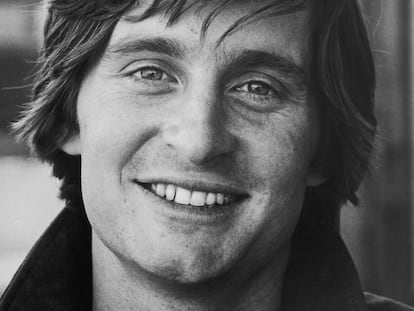
In the mid-1960s, Kirk Douglas bought the rights to One Flew Over the Cuckoo’s Nest with the idea of reprising the role of Randle McMurphy that he had played on Broadway. A decade later, the film hit the screen, produced by Michael Douglas and starring Jack Nicholson. The patriarch of the clan had sold the rights to his son, but he had not anticipated that he would give the role to Nicholson, believing that his father was too old to play the lead. Kirk never forgave him. The anecdote, recalled in the documentary The Douglas Dynasty: Fame, Addiction and Finding Home, serves to underline the determination with which Michael took control of his career from the beginning.
One Flew Over the Cuckoo’s Nest won five Oscars, including Best Picture, which a very young Michael Douglas collected from Audrey Hepburn. That night, the adaptation of Ken Kesey’s work equalled the record of It Happened One Night by winning all five major awards. It was the first time that the industry became aware the presence of Kirk’s son in Hollywood was going to be something more than a footnote.
Although nobody was talking about nepo babies at that time, that night Douglas began to shake off a very weighty label. His father was not only an icon on the screen, he was also the guy who had risked his career by allowing Dalton Trumbo, the most illustrious member of the Hollywood blacklist, to be credited as the screenwriter of Spartacus (1960). He was a Hollywood legend and a hero for freedom, and also an unrepentant flirt and thunderous personality. His shadow was as wide as it was long. After five decades of work it cannot be said that Michael Douglas has surpassed his father, but at the age of 80 he is an indisputable star, a renowned and bankable actor who during the 1990s became the most unexpected synonym for on-screen sexuality.
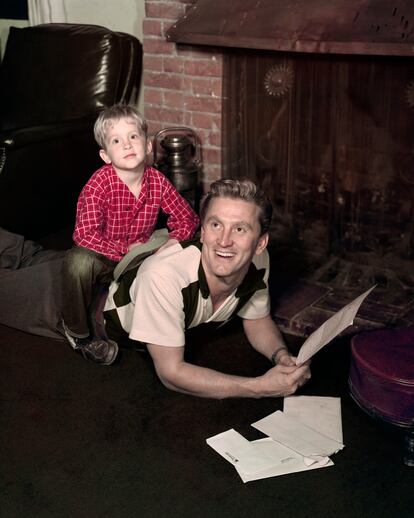
Michael Douglas began by specializing in characters that Kirk would never have played: hippies, pacifists, and sensitive bearded men, because he “didn’t even want to think that I could do anything that my father did.” His first major role came in The Streets of San Francisco, a police procedural in which he was paired with the legendary Karl Malden. Malden became his mentor and gave him valuable advice: “When you do crap, do it fast.” His place was in the cinema, although as he was not sure whether to act or produce, he opted to combine his efforts. His first big hit, The China Syndrome (1979), a thriller about an accident at a nuclear power plant that its sinister managers try to cover up, already showed a nose for the problems of its time. The nuclear lobby was not happy with the result and launched a campaign accusing the film of being irresponsible and implausible. Twelve days after the premiere, an accident at a nuclear plant in Pennsylvania gave them an advertising campaign as unwanted as it was effective.
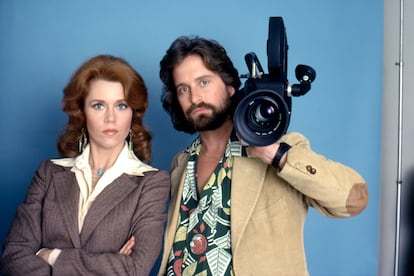
That movie helped to start a key trend in his films: surrounding himself with strong women. “My mother was an actress. I spent a lot of time with her backstage at the theater. So I’ve never been threatened by formidable women,” he told the Financial Times. “I’m proud that for nearly every woman I’ve worked with, it’s been one of her best roles. Kathleen Turner, Geneviève Bujold way back in Coma, Glenn Close in Fatal Attraction, Annette Bening, Sharon Stone. I try to make the environment as comfortable as possible, give them respect and protection.” Jane Fonda, his co-star in The China Syndrome, does not share such fond memories of him. “Michael has always cultivated public relations, not friendships. And that is why he has lasted so long in the business,” she said in Cannes.
Alongside one of those strong women, Turner, Douglas took an unexpected path. In Romancing the Stone (1984) and its sequel The Jewel of the Nile (1985), he became a brazen smuggler who functioned as both a gentle parody of Indiana Jones and a romantic comedy heartthrob. Both took their roles to heart. “We behaved like bandits on and off screen,” he declared in The Douglas Dynasty. They were engaged in a passionate romance until Diandra, Douglas’s wife at the time, showed up on the set and Turner discovered that, contrary to what he had told her, they were not separated.
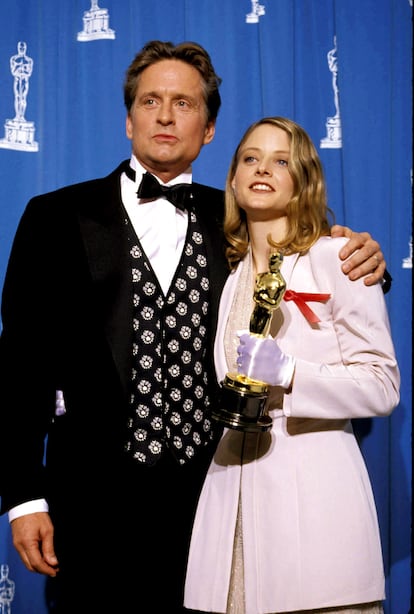
After those undeniable successes, a hero was born for the turbulent 1980s: Douglas was not classically handsome, his face did not seem to be carved from marble like his father’s, he was not slim or athletic, nor was he a typical muscle man like Stallone and Schwarzenegger, who reigned at the box office at that time. He was a soft forty-something with an avian profile and a slight double chin, but perhaps that was his appeal: he was credible in any role. Although not for everyone: Brian de Palma did not seriously consider his participation in a script he was working on, Fatal Attraction (1987), the story of a man who betrays his wife and puts his family at risk through his infidelity. In the end it was De Palma who abandoned the project, and Douglas became Dan Gallagher.
It was a special project for him. As he revealed to The Toronto Star in 1987, he was transfixed when he read the script. “I said to myself, ‘This is me, man. Only I can do this,’ and there’s something terrifying about that. This is the closest I’ve ever come to playing myself.” It’s hard to imagine a star making such an intimate statement about his private life these days. That it was believable, contrary to De Palma’s belief, became clear during the first public screenings. When Dan comes home after his infidelity and unmakes the bed so his wife thinks he’s slept at home, the women in the audience laughed knowingly. The film’s producer, Sherry Lansing, leaned over to him and whispered, “I can’t believe it. They’ve forgiven you already. You’re blessed with the gift of charm.”

Douglas thinks he knows why. “Maybe it’s because, in my evilness, the audience can still see there is a struggle and an ambivalence to do the right thing, so I’m not inherently just a violent, nasty person,” he told The Guardian. Adrian Lyne’s stylish thriller became a cultural phenomenon. It was the highest-grossing film of 1987 and a favourite topic of conversation, coining the term “bunny-boiler,” and achieving the seemingly impossible: Launching Douglas’s career as king of the erotic thriller, something of a paradox in the 1980s, perhaps the era in which physical beauty and youth were most valued.
That year he showed that not all his success was down to charm: at the Oscar gala, Glenn Close arrived as the big favourite (Cher finally won for Moonstruck) but it was he who went home with a statuette thanks to his incarnation of the amoral Gordon Gekko in Wall Street (1988). That same year, Douglas had embodied the two pillars of 1980s culture: sex and money and phrases like “greed is good” turned his character into a (questionable) role model. Nothing made him lose the public’s favor: he even came out unscathed from his violent slow-motion divorce in The War of the Roses (1989), again alongside his friend Kathleen Turner, a film that would be unfeasible today, perhaps because, as Vulture wrote: “The tension within Douglas, between a modern suaveness and an old-school machismo, is what makes all his cinematic humiliations fascinating.”
Basic Instinct (1992) was accused of being “violent, misogynistic, homophobic and inciting rape” (labels that Douglas rejects). The script had done the rounds of Hollywood offices for years without anyone daring to tackle it. The story of a trigger-happy cocaine-addicted cop and a bisexual murderess was too much for the moralizing of Hollywood. That someone did not see at first glance the potential of Joe Eszterhas’ fascinating and excessive screenplay is as incredible a priori as the attraction that a Sharon Stone at the height of her attractiveness feels in the film for Douglas. Nor was the premise of Disclosure (1994) easy to digest, the film with which Douglas completed the holy trinity of erotic thrillers, the most popular genre of the 1980s and early 1990s. Douglas now became an employee harassed by his boss (and ex-lover), played by Demi Moore.
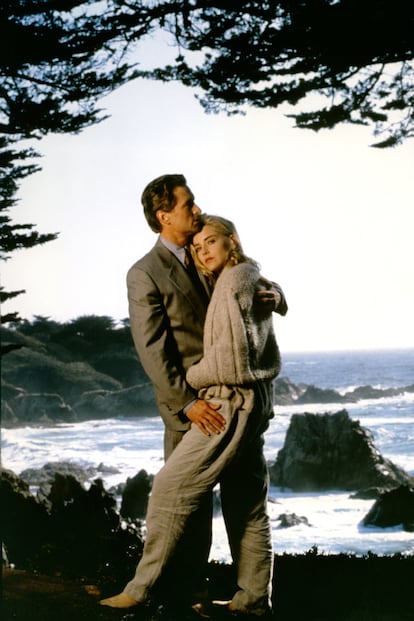
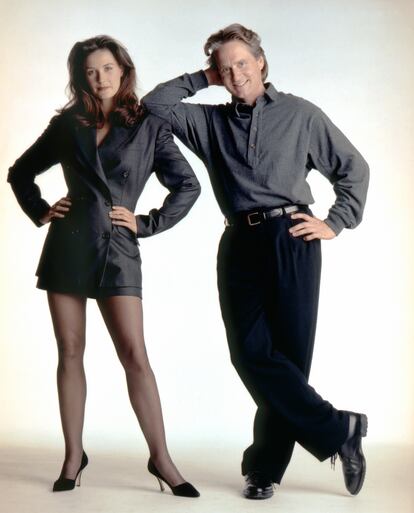
The actor was once again immersed in one of those phenomena that sparked debates and filled editorials. Although the passage of time has turned it into a laughable relic that symbolizes almost all the ills of the industry, how can it be explained that the great Hollywood movie about workplace harassment was centered on a male victim? But then nobody wanted delicate questions, only popcorn. Disclosure was a huge box office success with a line for the ages: “You stick your dick in my mouth and NOW you get an attack of morality?” Sex and morality: the fine line on which so many characters played by an actor who has never feared ambiguity have slipped dangerously. “My father’s generation chose between heroes and villains, because they came from the Second World War. My generation is that of Vietnam, and in reality we are talking about gray areas. My characters are put in crazy, almost impossible situations, and they have to see how they react to it and how they get ahead with the decisions they make,” he said last year at Cannes, where he was awarded the honorary Palme d’Or.

There is much more to Douglas than the erotic thrillers that marked his career. He emerged unscathed from David Fincher’s enigmatic The Game (1997), showed his most vulnerable side in the exquisite Wonder Boys (2000) and successfully replaced Harrison Ford in Traffic (2000), as rumor claimed that Ford was unable to adapt to the frenetic pace of filming imposed by Steven Soderbergh. Douglas gave one of his best performances in one of his personal favorite films, Falling Down (1993), the story of an office worker who has a violent breakdown. It is a movie that he claims to have built through his hairstyle. “I have a hairdresser to thank for deciding at the very last minute: ‘Let’s just go with a flat top.’ A lot of times, I do lead with my hair,” he told The Guardian. His fans agree: there is an online list of his films ranked according to how great his hair looks.
Accustomed to challenges, in the final stretch of his career Douglas entered the Marvel universe as Hank Pym, a role he chose in order not to lose contact with younger viewers. “Most of my films have been rated for adults. I really enjoy having children pulling on my jacket, saying: ‘Hank Pym! Ant-Man!’ It’s the closest thing to immortality that an actor can get,” he said.
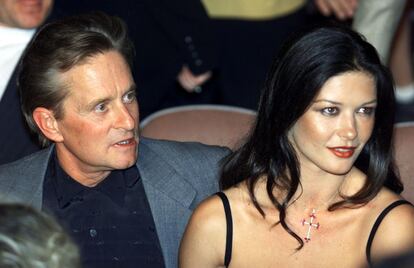
Douglas has not shied away from returning to television either. He won a Golden Globe for playing the flamboyant Liberace in Behind the Candelabra (2013), a love story (his partner was Matt Damon) “too gay for Hollywood,” and he won another for his role in the sarcastic The Kominsky Method (2018), in which he reunited once more with Turner. A few months ago, he played Benjamin Franklin on Apple TV and at 80 years old he has no intention of retiring.
He started celebrating his 80th birthday in Valldemossa, in his beloved Mallorca, a few days ago. At his side, Catherine Zeta-Jones, the woman he fell in love with the first time he saw her on a movie screen. “I am going to be the father of your children,” he told her on their first date. He was. Michael Douglas has fulfilled his dreams and also many of the fantasies of a generation.
Sign up for our weekly newsletter to get more English-language news coverage from EL PAÍS USA Edition
Tu suscripción se está usando en otro dispositivo
¿Quieres añadir otro usuario a tu suscripción?
Si continúas leyendo en este dispositivo, no se podrá leer en el otro.
FlechaTu suscripción se está usando en otro dispositivo y solo puedes acceder a EL PAÍS desde un dispositivo a la vez.
Si quieres compartir tu cuenta, cambia tu suscripción a la modalidad Premium, así podrás añadir otro usuario. Cada uno accederá con su propia cuenta de email, lo que os permitirá personalizar vuestra experiencia en EL PAÍS.
¿Tienes una suscripción de empresa? Accede aquí para contratar más cuentas.
En el caso de no saber quién está usando tu cuenta, te recomendamos cambiar tu contraseña aquí.
Si decides continuar compartiendo tu cuenta, este mensaje se mostrará en tu dispositivo y en el de la otra persona que está usando tu cuenta de forma indefinida, afectando a tu experiencia de lectura. Puedes consultar aquí los términos y condiciones de la suscripción digital.









































